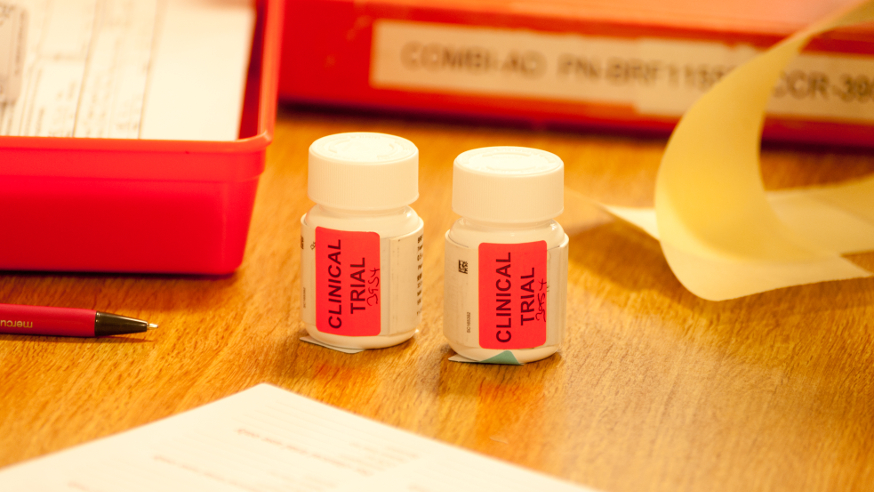
The Institute of Cancer Research, London and global healthcare company BTG have successfully concluded negotiations with a biopharmaceutical company, Carrick Therapeutics, to take a promising precision drug discovered at The Institute of Cancer Research into a later-stage clinical trial.
Under the deal, Carrick has licensed exclusive worldwide rights to develop and commercialise the drug.
If successful, it is hoped data from the new trial – to be led by Dr Susana Banerjee at our partner hospital, The Royal Marsden NHS Foundation Trust – would be enough to gain approval for use of the drug in a group of women who are poorly served by current treatment options.
Targets ovarian cancer where chemotherapy has failed
The drug is the first of its type. Previously known as BTG945 and ONX-0801, it has been renamed CT900 following the transfer of the programme to Carrick.
The drug works by directly targeting ovarian cancer cells via a protein called the alpha-folate receptor, which is highly over-expressed in some ovarian cancer patients.
Once inside cancer cells, CT900 kills them by inhibiting another protein called thymidylate synthase.
The drug could be suitable for women with ovarian cancer for whom chemotherapy has failed, and whose tumours have high levels of the alpha-folate receptor on the surface of cancer cells.
We’re convinced that working in close partnership with industry is essential to take results into the clinic as soon as possible, and make sure our research delivers maximum benefit for cancer patients.
Read more
Drug shrinks tumours in 7 of 15 women
CT900 was created by a team in the Cancer Research UK Cancer Therapeutics Unit at the ICR. The ICR also carried out research leading to a phase I trial which has shown CT900 drug to be safe as well as providing exciting evidence of effectiveness.
That trial, led by Professor Udai Banerji, Deputy Director of the world-leading Drug Development Unit at the ICR and The Royal Marsden, showed that the drug shrank tumours in seven of 15 women with ovarian cancer who had stopped responding to the standard treatment of chemotherapy.
The trial team has also carried out pharmacodynamic studies that showed evidence of the drug acting on its target in patient scans, and developed predictive biomarkers could be used to identify women with the best chance of responding.
The ICR Enterprise Unit worked closely with partner BTG to negotiate and conclude the terms of the new partnership.
Professor Udai Banerji, Professor of Molecular Cancer Pharmacology at the ICR and Consultant Medical Oncologist at The Royal Marsden, said:
“I’m delighted that this research programme is entering a new phase, which could lead to a new drug becoming available for women with ovarian cancer who desperately need more options.
“Our early-stage trial, underpinned by the science we carried out to discover and develop the drug at the ICR, showed tumours shrinking in patients with ovarian cancer who had progressed after having multiple previous lines of chemotherapy.
“The fact that the drug works as a single agent and that it has a predictive biomarker of response increases its chance of success in future clinical trials.”
'A pleasure' to establish new partnerships
Dr Toby Richardson, Deputy Director of Enterprise at the ICR, who was involved in the commercialisation work, said:
“We’re very pleased to be partnering with Carrick to bring CT900 into the larger trials that are needed to confirm that it’s an effective drug for the treatment of some high-grade ovarian cancers.
“It’s always a pleasure to establish new partnerships with companies who we think have the knowledge and skills to help us transform our discoveries into new treatments.”
Elaine Sullivan, Chief Executive of Carrick Therapeutics, said:
“The addition of CT900 to our pipeline further strengthens Carrick’s multi-asset, novel portfolio targeting critical pathways that drive aggressive and resistant cancers. Since our inception two years ago Carrick has made excellent progress and is now developing two assets that have the potential to meet significant unmet needs for patients.”
She added: “CT900, which is a new targeted therapy, has already demonstrated clinical activity in platinum-resistant/refractory high-grade serous ovarian cancer. In addition to ovarian cancer, we will be investigating CT900 in other difficult to treat cancers that express high levels of folate receptor alpha.
“These patients can be selected via a companion diagnostic based on folate receptor alpha expression. We believe CT900 shows real potential to make a meaningful difference to patients’ lives.”
Coinciding with the commercial announcement, Carrick Therapeutics has also announced the appointment of new Chairman George Golumbeski.
Work with the ICR
The ICR establishes fruitful and effective partnerships with industry to bring our discoveries to cancer patients.
These partnerships have put the ICR at or near the top of international rankings for the commercialisation of our research, and have successfully taken many treatments into the clinic.
Commercial partners can meet us through our programme of industry networking events or by contacting the Enterprise Unit. To keep on top of meeting opportunities and news about our research collaborations, subscribe to our industry newsletter Connections.